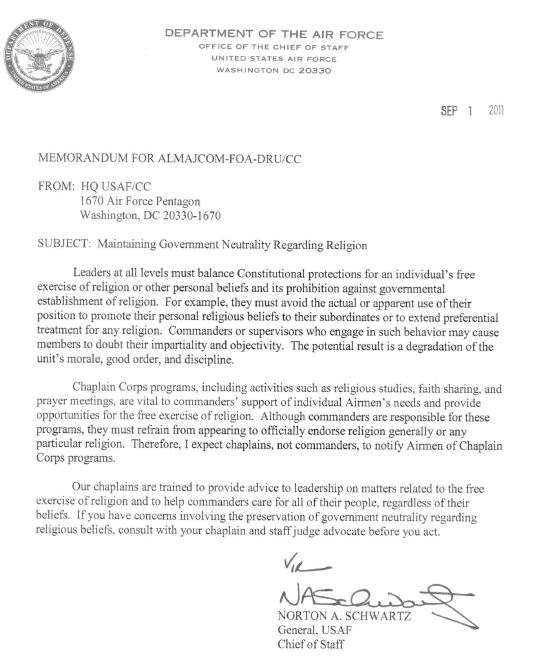Air Force Chief Institutes Stronger Controls on Command Religion
Air Force Chief of Staff General Norton Schwartz has issued a new memorandum on “Maintaining Government Neutrality Regarding Religion.” This new memorandum puts responsibility on the chaplains to maintain government neutrality. There are also positive statements that better validate nontheistic and secular life stances.
The tone of this message validates the importance of both free exercise and establishment protections. Equating these two clauses is an important step toward equality. This parallels the efforts of MAAF, specifically at the Air Force Academy, to improve policy.
Also including is not just “religion” in the supernatural sense, but “other personal beliefs.” While this is not ideal language, the effect is to validate nontheistic and humanistic philosophies and provide encouragement to those atheists and humanists seeking full recognition and support from military leaders.
Gen. Schwartz makes a positive assertion that, “Our chaplains are trained … to help commanders care for all of their people, regardless of their beliefs.” This is important because it shows the responsibilities of chaplains to atheists and humanists as well as those with supernatural religious beliefs. Unfortunately, the statement is incorrect in that chaplains are not trained to specifically provide for those with a nontheistic or humanistic perspective. General training in secular/interfaith support is the same as training in the nontheist perspective. This training is needed for the same reason chaplains receive special training on the Christian Protestant, Orthodox, and Catholic traditions separately, as well as many other traditional religious perspectives. These are much closer in nature than the nontheist perspective, so the need to address the nontheist perspective in chaplain training is even greater. Gen. Schwartz will should ensure training is in place to teach chaplains to understand atheists and humanists explicitly.
Gen Schwartz refers to “religious studies, faith sharing, and prayer meetings” to provide examples of activities that can create conflict and perception of bias. He affirms the rights of individuals to engage in these activities privately, but only within the context of Constitutional protections, command neutrality, and respect for fellow Airmen.
The primary purpose and effect of this memorandum is the specific injunction against command notifications about religious and chaplain events. This provides an important protection against official, command-endorsed religious activities like prayer breakfasts, concerts, religious holidays, and worship services.

